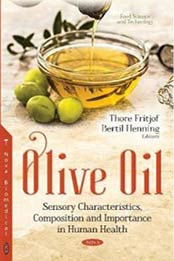
- Title: Olive Oil: Sensory Characteristics, Composition and Importance in Human Health (Food Science and Technology)
- Autor:Thore Fritjof, Bertil Henning
- Pages: 174
- Publisher (Publication Date): Nova Science Pub Inc 2017-12-31
- Language: English
- ISBN-10: 1536125636
- Download File Format: PDF
In Chapter One, D.M. Salazar, I. López-Cortés, and D.C. Salazar-García give an overview of the composition of fatty acids, tocopherols, and polyphenols in oils from the main five olive areas. They conclude that it is advisable to consume extra virgin olive oils during the prenatal period, childhood, and in combating disease. In Chapter Two, Hédia Manai Djebali and Imen Oueslati examine the link between olive oil and human health, finding that the amounts of sterols depend on olive variety, ripening degree, oil extraction procedures, agronomic, and climatic conditions. In Chapter Three, Malika Drira, Ons Rekik, and Mohamed Bouaziz review the composition of olive oil, determining that it is rich in unsaturated fatty acids and also identifying 20 phenolic compounds from a plethora of phenolic types. María Dolores Alvarez, Wenceslao Canet, María José Jiméne, and Cristina Fernández present a study where samples of mashed potatoes enriched with extra virgin olive oil were perceived as softer in Chapter Four. In chapter five, Imen Oueslati and Hédia Manai explore the characteristics of the volatile compounds, as well as the enzymes involved, in different Mediterranean olive oil categories.